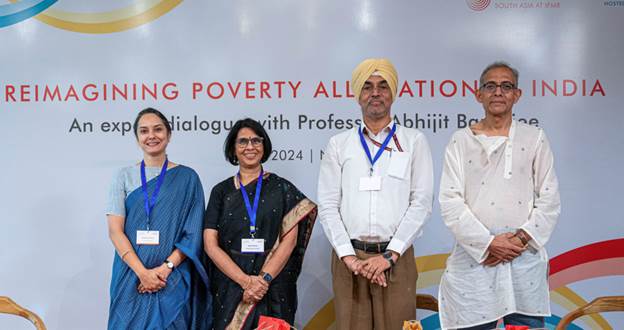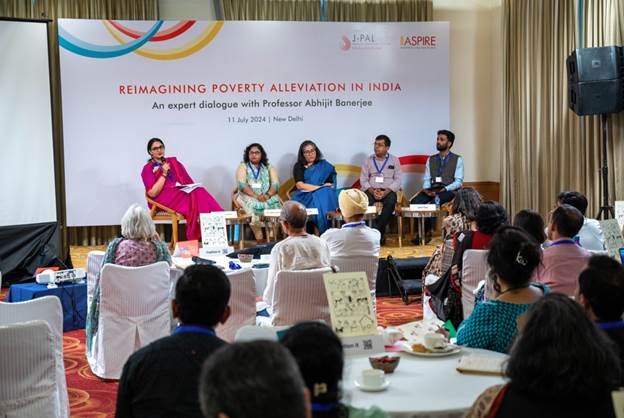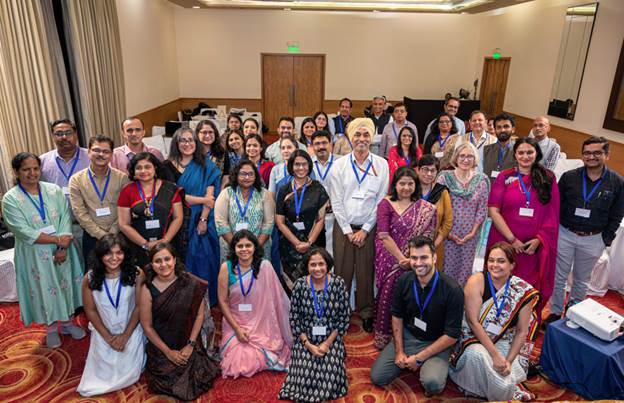Ministry of Rural Development
DAY-NRLM has mobilised more than 10.04 crore women into over 90.76 lakh self-help groups: Shri Charanjit Singh
Shri Singh emphasised on the need and significance of multi-stakeholder collaborations to reach people at the last mile to end poverty
Ministry of Rural Development emphasises inclusive livelihoods at an exclusive roundtable on poverty alleviation
Posted On:
12 JUL 2024 1:45PM by PIB Delhi
Additional Secretary, Rural Livelihoods, Ministry of Rural Development Shri Charanjit Singh reaffirmed the government’s commitment to fight the twin challenges of climate change and poverty by providing inclusive livelihoods to the last mile. Shri Charanjit Singh made these remarks at the exclusive Reimagining Poverty Alleviation in India roundtable organised by the Abdul Latif Jameel Poverty Action Lab (J-PAL) South Asia at New Delhi yesterday.

“No one should be left behind” as the government works towards realising the Prime Minister Shri Narendra Modi’s vision of making India a developed nation by 2047”, Shri Charanjit Singh said. He added that there is an urgent need to address the unique challenges faced by the poor women, which can often vary from State to State. The knowledge of the local community is vital to identify and solve such challenges. Speaking of MoRD’s innovative partnerships under DAY-NRLM, Shri Singh emphasised on the need and significance of multi-stakeholder collaborations to reach people at the last mile to end poverty. “If we work together, we can make a lot of difference,” he said.

Shri Singh informed that DAY-NRLM has mobilised more than 10.04 crore women into over 90.76 lakh self-help groups. It promotes financial inclusion, digital literacy, sustainable livelihoods and social development interventions. A holistic and inclusive approach to livelihood development for women has been a key feature of DAY-NRLM.

Speaking at the event, Joint Secretary, Rural Livelihoods, Ministry of Rural Development Ms Smriti Sharan said that ministry has been working in close collaboration with State governments to ensure effective implementation of the innovative projects in this field which are an adaptation of the Graduation Approach. These have been designed to put rural women on the path to self-sufficiency. The States have been adapting the program based on their priority areas. They are also working towards ensuring the poor households are brought under other social protection programmes. Stressing the need of scientific evidence and data as well as technology to tackle the multidimensional nature of poverty, Ms Smriti Sharan said that we have to move beyond the definition of monetary poverty.
J-PAL co-founder and Nobel Laureate Shri Abhijit Banerjee said that the Graduation Approach model can play a vital role in protecting the poor. These people are excluded but as soon as they get a chance, they begin taking charge of their lives.
Graduation Approach is a holistic livelihoods programme developed by NGO BRAC. It is among the most rigorously tested social protection programmes in the world today. Seven randomised evaluations by researchers affiliated with J-PAL and Innovations for Poverty Action have found the Graduation Approach to be effective in lifting the poor households out of poverty. It has reached more than 3 million households across 15 countries.
The roundtable was attended by representatives from MoRD, JEEViKA, BRAC, BMGF, World Bank and The/Nudge Institute among others. J-PAL co-founder and Nobel Laureate Abhijit Banerjee also shared his insights and lessons from studying the effects of the Graduation Approach for approximately two decades.
*****
SK/SS
(Release ID: 2032673)
Visitor Counter : 2889